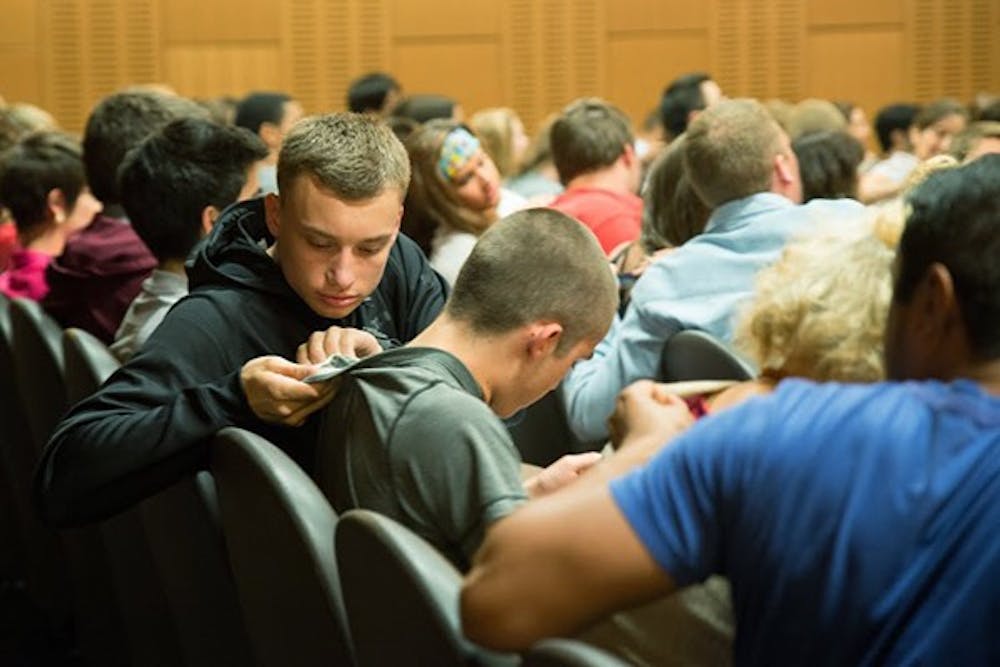 Students turn to one another to see what brands of clothes they are wearing at the beginning of a United Students Against Sweatshops worker tour event. (Photo by Andrew Ybanez)
Students turn to one another to see what brands of clothes they are wearing at the beginning of a United Students Against Sweatshops worker tour event. (Photo by Andrew Ybanez)Aklima Khanam, 20, paused to regain her composure as she told more than 150 ASU students about the day that changed her life.
Khanam, a Bangladeshi survivor of one of the deadliest garment factory accidents in history, visited the Tempe campus as part of the national "End Deathtraps" workers' tour Tuesday. “At the time the building started to collapse, the machine fell on me and the roof fell on me. ... I was stuck under the machine, and I was there for 12 hours that day (waiting to be rescued),” she said.
The ASU chapter of United Students Against Sweatshops held the event in an effort to persuade ASU President Michael Crow to join 12 other universities that require apparel companies to sign the Bangladesh Safety Accord.
The accord is an independent, legally biding agreement to ensure factories are safe for workers and accountable for keeping up with safety regulations.
VF Corporation, the parent company of The North Face, Vans and other well-known corporations, has been accused of unsafe garment factories in Bangladesh. The corporation declined to sign the safety accord despite many attempts by the USAS.
VF Corporation has 100 factories in Bangladesh and is linked to two factory fires in Bangladesh that claimed the lives of 19 people.
USAS, the nation's largest youth-led student labor campaign organization, is affiliated with more than 150 campuses. The organization strives to hold multinational companies accountable for the exploitation of workers and global justice.
Bangladeshi workers have struggled for many years to hold companies accountable for the safety of the buildings. Many avoidable tragedies take place in garment factories overseas because the laws and safety requirements vary from the U.S.
The Rana Plaza building collapse in Bangladesh resulted in the deaths of over 1,100 people and left over 2,000 severely injured in 2013.
Khanam shared her experiences with the students in the garment factory with the aid of a translator. She has been working in factories since she was 14 years old.
“I joined Rana Plaza in January 2013," she said. "I had to work from eight in the morning until midnight in that factory, but they did not pay as much as I worked.”
She recalled the fateful day of the collapse vividly.
“On (April) 24 in the morning, we all went to work, but it was unsafe, so workers did not want to enter, but the factory people forcefully entered us into the building and beat us,” she said. “After a while, there was a power outage, then the generator was started. As soon as the generator was started, the building started to collapse."
Transborder studies senior Jonathan Londoño, president of ASU's chapter of USAS, said he wants students to know they have the power to change what is happening to garment workers in Bangladesh.
“The University is tied to these issues and, being tied to these issues, they hold a responsibility in being the change for them," he said. "ASU can certainly be a part of the solution."
A part of the solution to the garment factory is establishing living wages for the workers along with the signing of the safety accord.
Sustainability senior Laura Azevedo said she was moved by the event and is hoping to get involved in the process of standing in solidarity. She said she would think twice about the things she purchases.
It’s important that students do research on apparel before purchasing, she said.
“Even though they do push that they’re a transparent company, like the Gap, I was pretty shocked that they’re not doing what they’re promising their clients,” she said.
Reach the reporter at Rashinda.bankhead@asu.edu or follow her on Twitter @rashindaa




